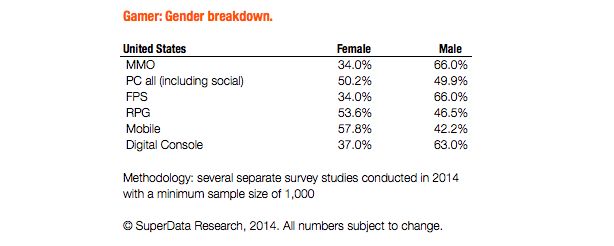A new report by SuperData Research shows just where the line divides between male and female gamers, in a story published by Joystiq.
According to the genre breakdown provided by SuperData, male audiences have a better preference over massive multiplayer online (MMO) games, with a 66 percent ratio compared to a 34 percent female audience. In addition, men also dominate in the FPS category by a similar ratio, 66 to 34 percent.
However, females have a bigger audience when it comes to general PC play, including socially linked games, with a slight 50.2 percent advantage over men’s 49.9 percent. In addition, they also dominate the RPG category with 53.6 percent compared to 46.5 percent of a male audience, and they also have a majority stake in mobile, with 57.8 percent compared to the male’s side at 42.4 percent.

This follows on the company’s previous MMO market report, which indicates that, with League of Legends players almost divide down the middle, with 60 percent males and 40 percent females.
“Women are closing the gamer gender gap as they represent two out of five MMO gamers,” SuperData said about the report. “Women account for almost half of MMO players, contrary to the stereotyped gamer landscape. Players between 18 and 30 account for 50 percent of the US MMO audience. These players represent the largest age group, many of which started playing MMOs as children, during the segment’s early years, and have continued into their adulthood. This generation is expected to expand the older markets as they age since they are the first generation to have grown up with MMOs.”
Meanwhile, NCBI recently posted its own findings on navigating the female audience with MMO games, namely World of Warcraft. In it, the firm explored a number of subjects, including the relationship of harassment and cyberbullying in such games, as well as the prevalence of sexism and gender stereotyping. The full report can be found here.
Such trends continue to be on the rise, and rather troubling news for the industry, as we explained previously in this article. That’s a shame, especially considering that female gamers are just as skilled and privy as their male counterparts, as they’ve proven on a number of occasions.
Even though many are in support of the gamer movement, it appears that such “trolls” won’t be going away anytime soon — and that could very well prompt companies to try and make moves to make female gamers a bit more welcome, no matter what genre they take a liking to. We certainly hope so.

